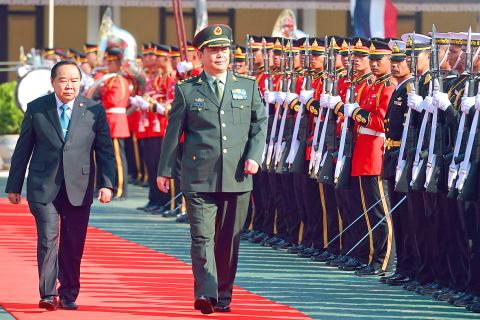China and Thailand yesterday agreed to boost military ties over the next five years, from increasing intelligence sharing to fighting transnational crime, as Thailand’s ruling junta seeks to counterbalance the country’s alliance with Washington.
The agreement came during a two-day visit by Chinese Minister of Defense General Chang Wanquan (常萬全) to Bangkok, and as Thailand’s military government looks to cultivate Beijing’s support amid Western unease over a delayed return to democracy.
“China has agreed to help Thailand increase protection of its own country and advise on technology to increase Thailand’s national security,” Thai Minister of Defense General Prawit Wongsuwan said.

Photo: AFP
“China will not intervene in Thailand’s politics, but will give political support and help maintain relationships at all levels. This is China’s policy,” he said.
Under the junta, Thailand has stepped up engagement with China at a time when Beijing increases its influence in Southeast Asia with a raft of loans and aid for infrastructure.
At the same time, Washington has sought to show its renewed commitment to a strategic “pivot” toward Asia by boosting military ties and equipment sales across the region.
Prawit said Thailand and China agreed to increase joint military exercises, but did not give further details.
“We agreed to increase joint military exercises between Thailand’s air force and China’s air force and to increase overall military cooperation over the next three to five years,” he said.
Thailand’s army took control in May last year, saying it needed to restore order after months of political unrest that included street protests in Bangkok that killed nearly 30 people. The US, a long-time ally of Thailand, expressed dismay at the coup and froze US$4.7 million of security-related assistance and canceled some security cooperation.
US-Thai relations deteriorated further last month when Bangkok accused Washington of meddling in its political affairs over the remarks by a visiting US envoy who criticized the junta.
The junta has said it will hold onto power for at least another year, with a general election planned for early next year.
Despite the tensions, the US will hold its annual Cobra Gold combined military exercise with Thailand next week. However, the drill has been scaled down in scope to humanitarian assistance and disaster relief.
The drill, Asia-Pacific’s largest annual multinational military exercise, also involves China.

NATIONAL SECURITY THREAT: An official said that Guan Guan’s comments had gone beyond the threshold of free speech, as she advocated for the destruction of the ROC China-born media influencer Guan Guan’s (關關) residency permit has been revoked for repeatedly posting pro-China content that threatens national security, the National Immigration Agency said yesterday. Guan Guan has said many controversial things in her videos posted to Douyin (抖音), including “the red flag will soon be painted all over Taiwan” and “Taiwan is an inseparable part of China,” while expressing hope for expedited “reunification.” The agency received multiple reports alleging that Guan Guan had advocated for armed reunification last year. After investigating, the agency last month issued a notice requiring her to appear and account for her actions. Guan Guan appeared as required,

A strong cold air mass is expected to arrive tonight, bringing a change in weather and a drop in temperature, the Central Weather Administration (CWA) said. The coldest time would be early on Thursday morning, with temperatures in some areas dipping as low as 8°C, it said. Daytime highs yesterday were 22°C to 24°C in northern and eastern Taiwan, and about 25°C to 28°C in the central and southern regions, it said. However, nighttime lows would dip to about 15°C to 16°C in central and northern Taiwan as well as the northeast, and 17°C to 19°C elsewhere, it said. Tropical Storm Nokaen, currently

‘NATO-PLUS’: ‘Our strategic partners in the Indo-Pacific are facing increasing aggression by the Chinese Communist Party,’ US Representative Rob Wittman said The US House of Representatives on Monday released its version of the Consolidated Appropriations Act, which includes US$1.15 billion to support security cooperation with Taiwan. The omnibus act, covering US$1.2 trillion of spending, allocates US$1 billion for the Taiwan Security Cooperation Initiative, as well as US$150 million for the replacement of defense articles and reimbursement of defense services provided to Taiwan. The fund allocations were based on the US National Defense Authorization Act for fiscal 2026 that was passed by the US Congress last month and authorized up to US$1 billion to the US Defense Security Cooperation Agency in support of the

PAPERS, PLEASE: The gang exploited the high value of the passports, selling them at inflated prices to Chinese buyers, who would treat them as ‘invisibility cloaks’ The Yilan District Court has handed four members of a syndicate prison terms ranging from one year and two months to two years and two months for their involvement in a scheme to purchase Taiwanese passports and resell them abroad at a massive markup. A Chinese human smuggling syndicate purchased Taiwanese passports through local criminal networks, exploiting the passports’ visa-free travel privileges to turn a profit of more than 20 times the original price, the court said. Such criminal organizations enable people to impersonate Taiwanese when entering and exiting Taiwan and other countries, undermining social order and the credibility of the nation’s